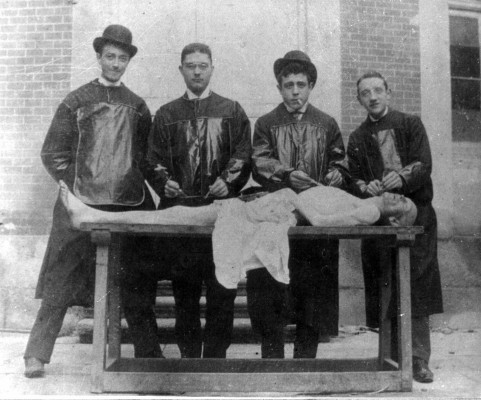Post Mortem: Death Investigation in America
Frontline, NPR, and Pro Publica (February 01, 2011)
Go Go Frontline. There are moments in this documentary on postmortem examinations in America and the attached medical-legal investigative personnel that made me physically groan.
Out loud.
And then slap my forehead.
None of the dead body images elicited any kind of response from me (shocking, I know). Rather, the interviews with some of the coroners and autopsy investigators were so painful to watch that I wondered if they really knew what kinds of documentaries Frontline makes. One of Frontline’s best investigative reporters, Lowell Bergman, is the on-camera interviewer and his abilities at making interview subjects squirm, especially those who lie or get caught in a certain-kind-of-truth-stretching, are phenomenal.
 The interview with Dr. Frank Minyard, the coroner for New Orleans, Louisiana, is some of the most cringe-worthy television that I have seen in a long time. A number of Death Reference Desk readers might know Dr. Minyard from his interviews about dealing with post-Hurricane Katrina New Orleans. Minyard is a complex figure, to be sure, and he doesn’t end up looking so good in this documentary. Ironically, he has been interviewed in other Frontline pieces, so it’s not as if he had no idea what could happen.
The interview with Dr. Frank Minyard, the coroner for New Orleans, Louisiana, is some of the most cringe-worthy television that I have seen in a long time. A number of Death Reference Desk readers might know Dr. Minyard from his interviews about dealing with post-Hurricane Katrina New Orleans. Minyard is a complex figure, to be sure, and he doesn’t end up looking so good in this documentary. Ironically, he has been interviewed in other Frontline pieces, so it’s not as if he had no idea what could happen.
But I digress…
Here, then, is the take away information from Post Mortem. 1.) The overall training, accreditation, and educational standards for American Medical Examiners needs to be uniform, rigorous, and regulated. As with the American funeral industry, for example, the education and licensing requirements are all state-by-state. This means that some states (and regions within states) are far more competent than others. In a nutshell, if you died and your death required a full investigation, then it’s better to die in some states than others.
Frontline produced a map of America which shows what kind(s) of postmortem investigation system(s) exist in each state. Check it out here.
The documentary’s other key point is that medical examiners and investigators need more money to do their work. This hardly comes as a surprise, since everybody wants more money to do their work, but the investigative labor being done involves guilt and innocence. I would always hope that the individuals given the power to provide evidence about either guilt or innocence, had the necessary funding to do the job. In some cases, this is not the case.
So watch this documentary. You can either view it right here or go to the Frontline website (linked at the top of this page).
It’s worth the 52 minutes and provides an opportunity to begin contemplating which American state you would want to die in…
Watch the full episode. See more FRONTLINE.
3 replies on “Postmortem on Frontline’s Post Mortem”
The joke in California (where I have my license as a funeral director) is that the requirement to take the funeral director’s exam is an AA degree in ANYTHING. I.e. Basketweaving, Auto mechanics, Sheep Shearing, etc.
You can also have been in jail for sexual assault as long as you’ve never been incarcerated for a financial crime.
Huzzah unregulated state by state death system!
It’s true. The lack of consistent regulatory oversight is a real problem in some states. I wonder if a person gets convicted of Corpse Abuse in CA (which is the legal way of saying Necrophilia), if he or she can still become a FD in California. Sort of the Karen Greenlee contingency.
[…] » Postmortem on Frontline’s Post Mortem Death Reference Desk […]